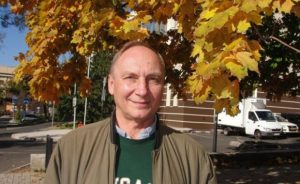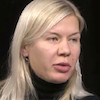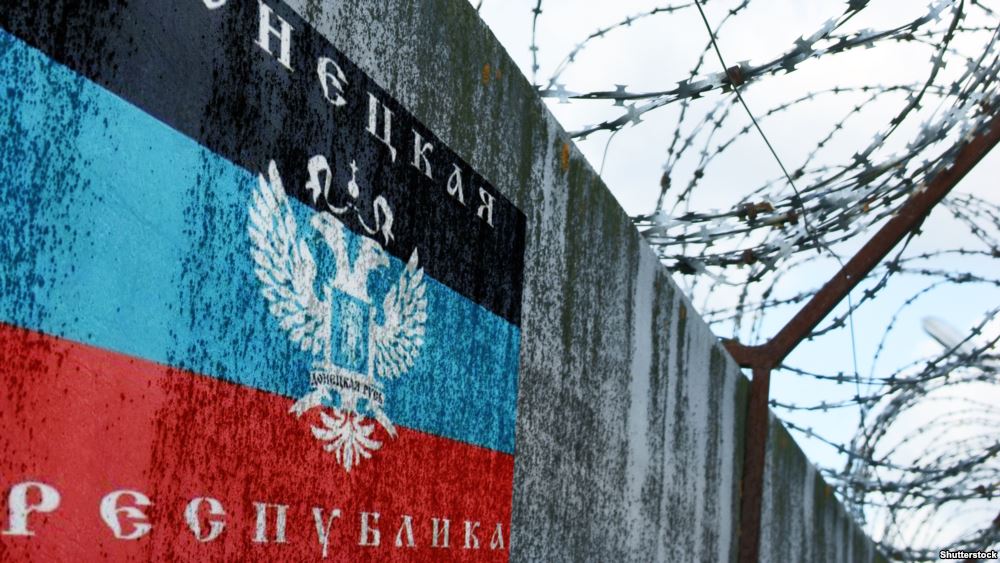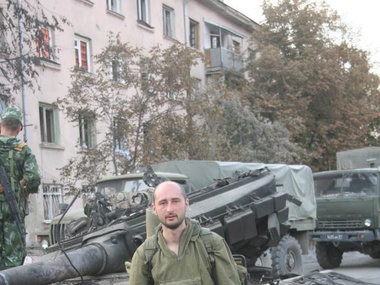As the economic situation in the occupied territories of the Donetsk Oblast worsens, authorities in the so-called Donetsk People's Republic (DNR) are "cracking down" on unhappy residents and arresting individuals suspected of pro-Ukrainian sentiments.
During the night of January 26-27, unknown persons attempted to blow up the statue of Lenin in the center of Donetsk. According to local volunteer Marina Cherenkova, the explosion occurred at 3:15 am. Cherenkova, who lives in Donetsk and travels frequently to Kyiv and Moscow, was home at the time. "The explosion awakened everyone. It wasn't clear what it was," she wrote in her Facebook.
Occupation authorities arrived at the scene within minutes. Vladyslav Latyntsev, head of a local pro-Russian organization (formerly head of the regional Party of Regions), posted gleefully on social media that "Lenin survived."

The following day, January 28, it was reported that the religious scholar Ihor Kozlovskyi was taken hostage. Kozlovskyi, president of the Center of Religious Research and International Spiritual Relations, who has always held pro-Ukrainian positions but did not speak out publicly, was staying in Donetsk due to the health problems of a family member. DNR operatives broke into his home and took him to an unknown location.
On January 29, in Donetsk, near the Cathedral of the Holy Virgin Ukrainian Greek Catholic Church on the Vasnetsov Prospect, DNR supporters held a demonstration with the slogan "Against Sects."
In the evening on January 29, unknown persons kidnapped Marina Cherenkova. She is one of the founders of the Responsible Citizens NGO, which distributes humanitarian aid, including aid from Rinat Akhmetov's foundation Dopomozhemo (we will help), in the occupied areas of the Donbas. Cherenkova is a deputy in the Donetsk Oblast Council and a member of the Party of Regions. The kidnapping of Cherenkova by members of the occupation administration has led to heated debates in social networks. After 12 hours Cherenkova contacted her mother and informed her that she was alive but still being held hostage.

On January 30, Latyntstev announced on Facebook that Lenin's statue had been repaired -- news that pleased former Party of Regions deputy (and fervent Yanukovych supporter -- Ed.) Olena Bondarenko. The Kyiv resident inevitably "likes" Latyntstev's ideological posts, and the two have close ties.
In addition to these kidnappings by DNR operatives in the Donetsk area, there is also information about the disappearance of several other Donetsk natives who came to visit relatives in the city but who seemed "suspicious" to the occupation authorities, which is why they were detained and taken as hostages to places of detention.
It is also known that homes of teachers of Ukrainian language and literature in Donetsk have been searched as well as those of members of Ukrainian civic organizations, whose activity is currently banned by the Donetsk occupation administration (although several members continue to remain in the oblast center).
Observers link all these actions to the search for those responsible for blowing up the Lenin monument, but it is more likely that the DNR group has begun to crack down in the occupied territories for fear of a social explosion. The explosion at the Lenin monument was only the pretext, and it is unknown who organized it exactly -- if it was really a "Ukrainian guerrilla group" (this version was voiced by Cherenkova's colleagues immediately after the explosion) or by DNR operatives in order to justify massive searches and hunts for the "enemy" for the purpose of hardening their "citizens."
Protests and economic collapse in Donetsk
On January 13, miners at the Makiiv Coal mine began a strike protesting non-payment of wages. The propaganda publication Makiivka Evening, which has been promoting the "Russian World" describes these events as follows:
"On January 13, 2016, postings on the social networks of Makiivka miners, especially those of Kholodna Balka mine, were beginning to encourage mass discontent and inciting to strikes," the newspaper reported. "In the beginning of the workday there were several people near the establishment itself, including female relatives of the miners working at this mine and former colleagues, who were actively agitating in order to disrupt the production process. The first shift, not fully understanding the situation, refused to go down in the mine and demanded immediate repayment of accumulated debt. The demands of the Kholodna Balka miners is based on absolutely justified and legitimate timely payment of wages -- the primary task of the head of each company. Possible options for the solution of this problem are already being investigated. The instigators (of the protests) have been identified and an investigation is taking place … The instigators immediately stopped their agitation and the workers, having lost sight of their 'leaders,' began to disperse on the territory of the mine."
The following week, the coal companies were asked to move to a five-day week. This was discussed at a meeting led by Ruslan Dubkivskyi, the so-called DNR "minister of coal and energy," the director general of the state coal associations of the "republics," and the leaders of the local trade union committees.
On January 22, the newspaper Novorossiya reported that a "budget" had been approved for the DNR-occupied territory, but only for the first quarter. The occupation authorities maintain that the budgetary planning is possible only for the quarter and not for the year or even for six months, as was the case in the beginning of 2015. Then the January issue of the newspaper Myrnyi Donbas reported that the DNR is planning its budget for six months. Now the planning has been reduced to the quarter. By the way, neither the discussion of the budget nor its approval by the so-called DNR "parliament" has taken place.
The so-called DNR "finance minister," Kateryna Matiushchenko, stated that "the major share of revenues are revenues from taxes on personal income and company profits as well as domestic taxes on goods and services (VAT, excise tax), and charges for moving and transit. A move to a 6-month budget in 2016 is not being planned because of martial law and because the unstable economic situation in the 'republic' makes it impossible to plan expenditures and revenues for the long term," she said.
In fact, the budget planning is done on a monthly basis because in reality 70% of the budget in the occupied territories depends on the Russian Federation -- including pension payments, social benefits, wages for the occupation administration, and so on.
The money arrives as cash in "white trucks" in humanitarian convoys from Russia. According to the estimates of the German newspaper Bild, Russia spends 1 billion US dollars annually to support the occupied territories. How much Russia will spend in the future nobody knows. This is the main fear of the occupation administration.
During 2015 there were 37 deliveries (11 in 2014) of the so-called "humanitarian convoys" in Donetsk. There were none in January 2016. The next one is being planned for mid-February but it is not definite that it will take place.
The newspaper Donetskaya Respublika
reported that "the humanitarian convoy of the Russian Ministry of Emergency Situations, will deliver almost 700 tons of cargo in 'white trucks': 318 tons of canned meat, 220 of canned fish, 42 milk products, 12 tons of rice grains, 8 tons of semolina, as well as 24 tons of table salt and buckwheat." In addition, it will bring one load from the Russian Ministry of Health, with nearly 14 tons of medicines, and another load from the Moscow Energy Institute, with nearly 12 tons of food.
On the "official site" of the DNR it is stated that: "More than 22 thousand tons of humanitarian aid from the Russian Federation have been received in 2015. The 'white trucks' delivered 18432 tons of food. Also included were building materials, seeds for sowing, soil fertilizer, educational literature, office materials, medicine, clothing and footwear, medical equipment, and other assistance."
Against this background of the total absence of the "republic's" own products and its dependence on humanitarian aid from Russia, the so-called minister of taxes and fees Tymofiev (nicknamed "Tashkent") declared on November 2, 2015, that the budget "showed a surplus."
"Tashkent's" statement appears false and is easily disproved by facts.
In January the DNR site reported: "At the distribution point of the humanitarian aid located in the administration building of the Petrovky district of Donetsk, 31299 people received humanitarian aid in 2015 . As of January 15, 2016, 7380 persons are registered with the 'humanitarian center.' The number of citizens who need help keeps growing due to unemployment, the closures of enterprises and difficult life situations."
In January the self-declared "mayor" of Makiivka, Larysa Tolstykina, announced to the media that the "republican government" is refusing to pay wages to miners. "In Makiivka for many years the miners lived on subsidies," she said. "But the past is the past. Today our task is to build break-even enterprises with a minimal budget since this direction is key both for the city and the 'republic.' Today, as you know, for obvious reasons there are absolutely not enough funds."
And finally, Aleksandr Zakharchenko, the so-called head of the DNR, announced an effort to economize: "One important issue is cutting the budget. There are unjustified expenses in all the ministries, most notably at the Ministry of Health and Education. Starting with the purchase of fuel for an inexcusable price, there are instances when the fuel that costs 40-odd rubles is purchased for 57. I see an element of corruption here. I find that staffing at the ministries is unreasonably inflated. And this situation is probably our fault. We must decide to optimize staffing and, of course, salaries."
To eliminate the consequences of insufficient funds and the resulting loss of the DNR's authority among the population, the occupation administration has begun a crackdown together with a very aggressive propaganda campaign in the sphere of the so-called "patriotic education of youth."
The self-proclaimed "minister of education," Larysa Poliakova, explained the strategy to the Oplot TV channel last week:
"An entire generation has been thrown off track," she said. "For the past 23 years there was a foreign ideology that was not ours. And now we need to emphasize spiritual and civic education. We need to develop the sense of citizenship in children. The study of the Russian language and literature is a priority. We must pay particular attention to ideology."
On January 23, one of the DNR propaganda TV channels aired a video with the following description: "Video provided by the Russian Bear company especially for News Front. The patriotic education in the DNR is playing a very important role in the life of the young republic." On the video teenagers with weapons are shown "learning patriotism."
Zakharchenko himself has issued several statements that have been ridiculed in Ukrainian media and social networks:
"After the declaration of independence of Ukraine they tried to impose a foreign ideology on us," he said. "We used to be raised on such core concepts as family, faithfulness, brotherhood, and love of country, but now we are raised on Coca-Cola, Mickey Mouse, jeans and so on … on Playboy. On a democracy that maintains that there can be two fathers or two mothers in a family. This is absolutely unacceptable. And morality itself is established at the gene level. We simply need to properly convey to our children that traditional values need to exist," he concluded.
In this fashion the occupiers are attempting to lay the foundation for the young generation, which will not be able to view itself without the "two-headed eagle" and the DNR tricolor as the "state" symbol. Even though it is doubtful if any of them can recite the words of the separatist hymn. But this is the next step in the "education." And the internal repressions are one of the elements of the "all-republican" strategy of suppressing all dissent, including dissatisfaction with salaries, social conditions even everyday life.
Oleksiy Matsuka is a Radio Svoboda journalist, host of the TV program Donbas Realities, and director of the Donetsk Information Institute. Matsuka was included on the list of "100 Information Heroes," first published by the Reporters without Borders organization. In October 2014, Matsuka was awarded the International Press Freedom Award by the Canadian Journalists for Free Expression.





